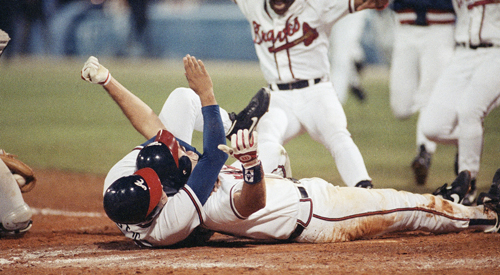
The franchise-shattering swing of Francisco Cabrera
Francisco Cabrera killed the Pittsburgh Pirates. This is how he did it.
With a 2-0 ninth-inning lead in Game 7 of the 1992 National League Championship Series, the Pirates were on the brink of eliminating the Atlanta Braves and heading off to Toronto to face the powerful Blue Jays in the World Series. The Braves had managed to scrape out a run and load the bases while giving up two of their final three outs when Braves manager Bobby Cox sent his final bench player to the plate – Francisco Cabrera.
Cabrera never made a significant long-term impact in Major League Baseball. He debuted – and played three games – with the Blue Jays, but quickly was sent to Atlanta. Over his six seasons with the Braves, he hit a measly .254 with 17 home runs and 262 RBI; not exactly stunning numbers. However, his lone at-bat on October 14, 1992 stands out in the minds of thousands of baseball fans in Pittsburgh as one of the greatest moments of misery in their long sporting history.
Pirate pitcher Stan Belinda threw a 2-1 pitch to Cabrera, who singled into left, scoring David Justice and Sid Bream, winning the game and the series for the Braves. It was just the 11th at-bat for Cabrera on the season, yet undoubtedly the greatest of his short professional career. The single not only expelled the Pittsburgh Pirates from the playoffs, it also eliminated them from baseball altogether.
That 1992 post-season run was the last of three consecutive trips to the NLCS for the Bucs, but it was also the last time Pittsburgh finished a season with a winning record. In the 16 years that have followed, the Pirates have finished higher than fourth in the NL East exactly twice, and have not finished a season with more than 79 wins. They also have the longest streak for consecutive losing seasons in sports, and they’re already less than a dozen losses away from adding to that in 2009.
[php snippet=1]
Usually it’s not easy to pinpoint exactly when the tides of fate change for a baseball team, but you could make a pretty good case that Francisco Cabrera’s series-clinching single ushered in an era of mediocrity for the Pittsburgh Pirates franchise. The Bucs walked off the field that night with their collective head low, having blown it for a third straight year, and haven’t raised them since. Not even players like Barry Bonds, Jason Bay, or Aramis Ramirez have been able to break the slump. The 2009 fire sale certainly makes it seem like the Pirates are mailing it in for the next couple of years at least.
The Pirates have clearly underperformed in the small Pittsburgh market. Early 2009 was a great time to be a sports fan in the city, with the Steelers winning the Super Bowl in February and the Penguins crowned Stanley Cup champions in June but success has not translated to their Major League brethren.
Hiding behind what has been called “small market syndrome”, they’ve been quick to trade players or let go of others whose contracts were getting too high. Their 2009 Opening Day payroll was just under $49 million, third lowest in the league, and there have been projections that they could go even lower in 2010. Amazingly enough, based on studies that say ‘a payroll of X should earn Y wins’, the Pirates have actually performed above financial expectations. Just don’t say that to anyone in Pittsburgh.
The state of baseball in western Pennsylvania is a mess. As for Francisco Cabrera, blame him all you want for the fate of the Pirates. However, less than a year after his famous single, Cabrera played his last game in the majors. You can buy his baseball cards for under a dollar at most card spots. Isn’t that punishment enough?
[php snippet=1]

